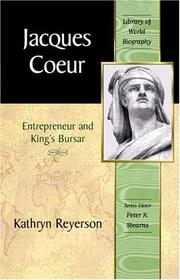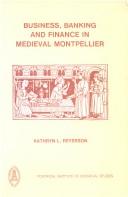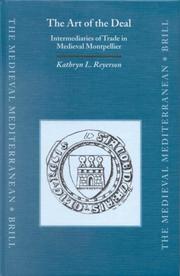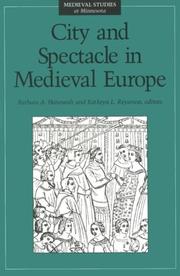| Listing 1 - 10 of 21 | << page >> |
Sort by
|
Book
ISBN: 3319389416 3319389424 Year: 2016 Publisher: Cham : Springer International Publishing : Imprint: Palgrave Macmillan,
Abstract | Keywords | Export | Availability | Bookmark
 Loading...
Loading...Choose an application
- Reference Manager
- EndNote
- RefWorks (Direct export to RefWorks)
This book illuminates the connections and interaction among women and between women and men during the medieval period. To do this, Kathryn L. Reyerson focuses specifically on the experiences of Agnes de Bossones, widow of a changer of the mercantile elite of Montpellier. Agnes was a real estate mogul and a patron of philanthropic institutions that permitted lower strata women to survive and thrive in a mature urban economy of the period before 1350. Notably, Montpellier was a large urban center in southern France. Linkages stretched horizontally and vertically in this robust urban environment, mitigating the restrictions of patriarchy and the constraints of gender. Using the story of Agnes de Bossones as a vehicle to larger discussions about gender, this book highlights the undeniable impact that networks had on women’s mobility and navigation within a restrictive medieval society.
History. --- France --- Europe --- Literature, Medieval. --- History of Medieval Europe. --- Medieval Literature. --- History of France. --- History—476-1492. --- Women --- History --- Social networks --- Human females --- Wimmin --- Woman --- Womon --- Womyn --- Females --- Human beings --- Femininity --- Europe-History-476-1492. --- France-History. --- European literature --- Medieval literature --- Europe—History—476-1492. --- France—History. --- Gay culture Europe --- 476-1492.
Book
ISBN: 9783319389417 Year: 2016 Publisher: Basingstoke Palgrave Macmillan
Abstract | Keywords | Export | Availability | Bookmark
 Loading...
Loading...Choose an application
- Reference Manager
- EndNote
- RefWorks (Direct export to RefWorks)

ISBN: 032108537X Year: 2005 Publisher: New York Pearson
Abstract | Keywords | Export | Availability | Bookmark
 Loading...
Loading...Choose an application
- Reference Manager
- EndNote
- RefWorks (Direct export to RefWorks)
Capitalists and financiers --- Cœur, Jacques, --- France --- History
Article
Abstract | Keywords | Export | Availability | Bookmark
 Loading...
Loading...Choose an application
- Reference Manager
- EndNote
- RefWorks (Direct export to RefWorks)

ISBN: 0888440758 9780888440754 Year: 1985 Volume: 75 Publisher: Toronto: Pontifical institute of mediaeval studies,
Abstract | Keywords | Export | Availability | Bookmark
 Loading...
Loading...Choose an application
- Reference Manager
- EndNote
- RefWorks (Direct export to RefWorks)
Banks and banking --- Credit --- History --- Montpellier (France) --- Commerce --- 336 "04/14" --- -Credit --- -Finance --- -Funding --- Funds --- Economics --- Currency question --- Borrowing --- Finance --- Money --- Loans --- Agricultural banks --- Banking --- Banking industry --- Commercial banks --- Depository institutions --- Financial institutions --- Financien. Openbare financien. Bank- en geldwezen --(internationale financien zie {339.7})--Middeleeuwen --- -Montpellier (France) --- -Commerce --- -History --- Economic conditions --- History. --- -Financien. Openbare financien. Bank- en geldwezen --(internationale financien zie {339.7})--Middeleeuwen --- 336 "04/14" Financien. Openbare financien. Bank- en geldwezen --(internationale financien zie {339.7})--Middeleeuwen --- Funding --- Economic conditions. --- Montpellier. Handel. 1000-1500. --- Montpellier. Histoire économique. 1000-1500. --- Montpellier. Commerce. 1000-1500. --- Montpellier. Economische geschiedenis. 1000-1500. --- Banks and banking - France - Montpellier - History --- Credit - France - Montpellier - History --- Montpellier (France) - Commerce - History

ISSN: 09285520 ISBN: 9004121293 9004475567 9789004121294 9789004475564 Year: 2002 Volume: 37 Publisher: Leiden: Brill,
Abstract | Keywords | Export | Availability | Bookmark
 Loading...
Loading...Choose an application
- Reference Manager
- EndNote
- RefWorks (Direct export to RefWorks)
Medieval commercial transactions did not occur spontaneously. They were crafted by merchants with the support of numerous personnel on the medieval marketplace: notaries, innkeepers, brokers, transporters, and subordinate personnel of the merchant's entourage. This study introduces the reader to the challenges of trade in the Mediterranean world and to specific market conditions in the Mediterranean French town of Montpellier. A case study of the business of the Cabanis merchants permits an in-depth examination of the facilitation of trade by intermediaries whose activities are traced in the discovery phase of arranging a deal and in its closing and execution. Medieval business practice involved multiple layers of personnel. The complexities of medieval trade are revealed in the new emphasis given to those who assisted merchants in their commercial endeavors.
Montpellier (France) --- Commerce --- History. --- History of France --- anno 1200-1499 --- Montpellier --- History --- Montpellier (France) - Commerce - History. --- commerce --- Middle Ages

ISBN: 0816623597 0816623600 Year: 1994 Volume: 6 Publisher: Minneapolis : University of Minnesota Press,
Abstract | Keywords | Export | Availability | Bookmark
 Loading...
Loading...Choose an application
- Reference Manager
- EndNote
- RefWorks (Direct export to RefWorks)
Beschaving [Middeleeuwse ] --- Cities and towns [Medieval ] --- Civilisation médiévale --- Civilization [Medieval ] --- Civilization [Medieval ]--History --- Europa--Beschaving--476-1492 --- Europe--Civilisation--476-1492 --- Europe--Civilization--476-1492 --- Medieval cities and towns --- Medieval civilization --- Middeleeuwen--Beschaving --- Middeleeuwen--Cultuur --- Middeleeuwse beschaving --- Middeleeuwse cultuur --- Middeleeuwse steden --- Middle Ages--Civilization --- Moyen-Age--Civilisation --- Steden [Middeleeuwse ] --- Villes médiévales --- 394 "04/14" --- -Rites and ceremonies, Medieval --- -Medieval rites and ceremonies --- Ritueel. Openbaar leven. Maatschappelijk leven. Banketten. Volksfeesten. Carnaval. Spelen. Dansen. Optochten. Jaarmarkt. Kermissen. Ruiterfeesten.--Middeleeuwen --- -Ritueel. Openbaar leven. Maatschappelijk leven. Banketten. Volksfeesten. Carnaval. Spelen. Dansen. Optochten. Jaarmarkt. Kermissen. Ruiterfeesten.--Middeleeuwen --- 394 "04/14" Ritueel. Openbaar leven. Maatschappelijk leven. Banketten. Volksfeesten. Carnaval. Spelen. Dansen. Optochten. Jaarmarkt. Kermissen. Ruiterfeesten.--Middeleeuwen --- Medieval rites and ceremonies --- Cities and towns, Medieval. --- Civilization, Medieval. --- Festivals --- Rites and ceremonies, Medieval. --- History --- Cities and towns, Medieval --- Civilization, Medieval --- Rites and ceremonies, Medieval --- 930.85.42 --- Middle Ages --- Civilization --- Chivalry --- Renaissance --- 930.85.42 Cultuurgeschiedenis: Middeleeuwen --- Cultuurgeschiedenis: Middeleeuwen --- Days --- Manners and customs --- Anniversaries --- Fasts and feasts --- Pageants --- Processions --- Rites and ceremonies --- Rites et cérémonies --- Villes médiévales --- Civilisation médiévale --- History. --- Histoire --- Europe --- Festivals - Europe - History. --- Rites and ceremonies - Europe - History.
Book
ISBN: 9780812249613 0812249615 0812294505 Year: 2018 Publisher: Philadelphia, Pa University of Pennsylvania Press
Abstract | Keywords | Export | Availability | Bookmark
 Loading...
Loading...Choose an application
- Reference Manager
- EndNote
- RefWorks (Direct export to RefWorks)
In the late 1320s, Martha de Cabanis was widowed with three young sons, eleven, eight, and four years of age. Her challenges would be many: to raise and train her children to carry on their father's business; to preserve that business until they were ready to take over; and to look after her own financial well-being. Examining the visible trail Martha left in Montpellier's notarial registers and other records, Kathryn L. Reyerson reveals a wealth of information about her activities, particularly in the area of business, commerce, and real estate. From these formal, contractual documents, Reyerson gleans something of Martha's personality and reconstructs what she may have done, and a good deal of what she actually did, in her various roles of daughter, wife, mother, and widow. Mother and Sons, Inc. demonstrates that while women were hardly equal to men in the fourteenth century, under the right conditions afforded by wealth and the status of widowhood, they could do and did more than many have thought. Within the space of twenty years, Martha developed a complex real estate fortune, enlarged a cloth manufacturing business and trading venture, and provided for the support and education of her sons. Just how the widow Martha maneuvered within the legal constraints of her social, economic, and personal status forms the heart of the book's investigation.
Women merchants --- Widows --- Guardian and ward --- Guardianships --- Tutelage --- Wards --- Domestic relations --- Trusts and trustees --- Conservatorships --- Interdiction (Civil law) --- Market women --- Businesswomen --- Merchants --- Marital status --- Women --- History --- Law and legislation --- Cabanis, Martha de, --- Montpellier (France) --- Economic conditions. --- Cabanis, de, Martha --- Montpellier
Digital
ISBN: 9783319389424 Year: 2016 Publisher: Cham Springer International Publishing :Imprint: Palgrave Macmillan
Abstract | Keywords | Export | Availability | Bookmark
 Loading...
Loading...Choose an application
- Reference Manager
- EndNote
- RefWorks (Direct export to RefWorks)
This book illuminates the connections and interaction among women and between women and men during the medieval period. To do this, Kathryn L. Reyerson focuses specifically on the experiences of Agnes de Bossones, widow of a changer of the mercantile elite of Montpellier. Agnes was a real estate mogul and a patron of philanthropic institutions that permitted lower strata women to survive and thrive in a mature urban economy of the period before 1350. Notably, Montpellier was a large urban center in southern France. Linkages stretched horizontally and vertically in this robust urban environment, mitigating the restrictions of patriarchy and the constraints of gender. Using the story of Agnes de Bossones as a vehicle to larger discussions about gender, this book highlights the undeniable impact that networks had on women’s mobility and navigation within a restrictive medieval society.
Old English literature --- History --- History of France --- History of Europe --- geschiedenis --- literatuur --- gender --- Europese geschiedenis --- middeleeuwen --- anno 500-1499 --- anno 500-799 --- anno 800-1199 --- anno 1200-1499 --- France --- Europe
Book
ISBN: 9781409455998 9781472435101 9781472435118 1409455998 1472435109 1472435117 9781315594767 9781317098034 9781317098041 9781138245433 Year: 2014 Publisher: Farnham Ashgate
Abstract | Keywords | Export | Availability | Bookmark
 Loading...
Loading...Choose an application
- Reference Manager
- EndNote
- RefWorks (Direct export to RefWorks)
The first full length volume to approach the premodern Mediterranean from a fully interdisciplinary perspective, this collection defines the Mediterranean as a coherent region with distinct patterns of social, political, and cultural exchange. The essays explore the production, modification, and circulation of identities based on religion, ethnicity, profession, gender, and status as free or slave within three distinctive Mediterranean geographies: islands, entrepôts and empires. Individual essays explore such topics as interreligious conflict and accommodation; immigration and diaspora; polylingualism; classical imitation and canon formation; traffic in sacred objects; Mediterranean slavery; and the dream of a reintegrated Roman empire. Integrating environmental, social, political, religious, literary, artistic, and linguistic concerns, this collection offers a new model for approaching a distinct geographical region as a unique site of cultural and social exchange.--
Comparative literature --- Thematology --- Mediterranean countries --- Literature. --- Mediterranean Region --- Mediterranean Region. --- In literature.
| Listing 1 - 10 of 21 | << page >> |
Sort by
|

 Search
Search Feedback
Feedback About UniCat
About UniCat  Help
Help News
News